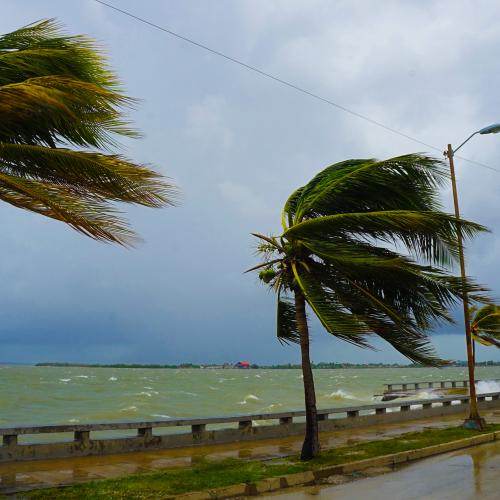Disaster Grants Program
LSC's Disaster Grants program provides funding to LSC-funded organizations providing services to survivors of government-declared emergencies and coordinating preparation efforts for future natural disasters.

Mission
The LSC Disaster Grants Program provides funding and support to LSC-funded legal aid organizations, enabling them to help low-income disaster survivors access essential legal services. The program educates survivors, legal aid organizations, and the disaster community about available disaster legal services. Additionally, it provides crucial disaster preparation and response information to survivors, organizations, and legal advocates.

Overview
Legal services providers are a critical component of comprehensive disaster relief, offering vital support to survivors long after other responders have departed. LSC's 2022 Justice Gap report revealed low-income Americans did not receive any or enough legal help for 92% of their civil legal problems.
As the leading funder of civil legal aid for low-income disaster survivors in the United States, LSC plays a unique and vital role in ensuring access to justice in the wake of disasters. LSC ensures legal aid organizations across the country to address a wide range of legal challenges for survivors, including housing issues, insurance claims, FEMA appeals, and document replacement.
LSC's approach to disaster legal aid has evolved significantly, encompassing preparedness, immediate response, and long-term recovery. LSC broad work to address the justice gap includes continuing to adapt to meet the changing needs of low-income disaster survivors, addressing challenges such as reaching rural and remote areas, supporting survivors with disabilities, and addressing employment obstacles in disaster-impacted communities.
As natural disasters become more frequent and severe, LSC's role in coordinating and supporting legal aid efforts remains crucial. By fostering collaboration among stakeholders and providing essential resources, LSC ensures that Americans receive the legal assistance they need before, during, and long after disasters strike.
Grant Types
-
Disaster Relief Emergency Grants
-
Disaster Supplemental Appropriation (DSA) Project Grants
-
Disaster Supplemental Appropriation (DSA) Incurred Costs Grants
-
The Midwest Legal Aid Disaster Coordination Project (MLDCP)
Disaster Relief Emergency Grants provide funding to LSC grantees in areas with government-declared emergencies, including those declared by state governors or tribal governments. These grants support responses to office damage or surges in legal aid demand resulting from disasters. DREGs are funded through returned Basic Field funds and remain available year-round until depleted. Grant terms and amounts vary based on disaster severity and are designed to support immediate recovery efforts.
Disaster Supplemental Appropriation (DSA) Project Grants fund future civil legal services activities related to the consequences of hurricanes, wildfires, earthquakes, and other extreme weather events occurring within timeframes specified by Congress. Eligibility requires a FEMA Major Disaster Declaration in the grantee's service area. These prospective grants support comprehensive strategies addressing complex disaster-related legal needs. Funding comes directly from Congressional Disaster Relief Supplemental Appropriations.
Disaster Supplemental Appropriation (DSA) Incurred Costs Grants reimburse eligible LSC grantees for expenses already incurred when responding to disasters occurring within timeframes specified by Congress. Eligibility requires a FEMA Major Disaster Declaration in the grantee's service area. Reimbursable expenses must relate to disaster consequences and typically cover costs from the disaster date through a specified cutoff. These retrospective grants help grantees recover resources already mobilized for disaster response.
The Midwest Legal Aid Disaster Coordination Project (MLDCP) is a disaster resiliency initiative supporting LSC Basic Field grantees across ten Midwest states, aiming to enhance preparedness in low-income communities and strengthen disaster legal aid response capabilities across the Midwest. The project offers project grants and mentorship grants while fostering collaboration among LSC grantees, volunteer attorneys, and established disaster response organizations to address crucial disaster-related legal needs.

Resources
Legal Aid Disaster Resource Center
The Legal Aid Disaster Resource Center is a national website designed to help legal aid and other service organizations more effectively meet the civil legal needs of disaster survivors. The website serves as a one-stop resource for disaster training materials and expertise, offering practical tools, resources, and a nationwide knowledge bank to assist attorneys, volunteers, and disaster survivors in responding to and recovering from disasters across the country.
Heartland Disaster Help
Heartland Disaster Help is a comprehensive online resource providing real-time disaster risk assessment and recovery guidance for residents in Arkansas, Iowa, Kansas, Minnesota, Missouri, Montana, Nebraska, North Dakota, Oklahoma, and South Dakota. The website offers localized information on floods, windstorms, extreme heat, and wildfires, including preparation tips, recovery recommendations, and local aid organization directories, while also providing valuable content applicable nationwide.
LSC Disaster Task Force Report
The LSC Disaster Task Force Report provides comprehensive guidance on strengthening legal aid response systems for disaster-affected communities, with recommendations focusing on integrating legal services into emergency management, training providers, and improving disaster preparedness for vulnerable populations. Created through extensive field research and stakeholder input, this resource outlines concrete steps for legal services providers to build sustainable approaches in helping low-income individuals and communities prepare for, respond to, and recover from disasters.
Federal Emergency Management Agency (FEMA)
The Federal Emergency Management Agency (FEMA) is the U.S. government agency responsible for coordinating the response to disasters that overwhelm local and state resources. FEMA leads and supports the nation in a risk-based, comprehensive emergency management system of preparedness, protection, response, recovery, and mitigation to reduce the loss of life and property and protect communities nationwide from all hazards including natural disasters, acts of terrorism, and other man-made disasters.
National Voluntary Organizations Active in Disaster
The National Voluntary Organizations Active in Disaster (National VOAD or NVOAD) is a coalition of major U.S. voluntary organizations dedicated to disaster-related work, providing skilled services across the full spectrum of disaster management from prevention to recovery. National VOAD coordinates and facilitates collaboration among its member agencies to ensure comprehensive and efficient disaster response and recovery efforts.
ABA Disaster Relief
The American Bar Association (ABA) Standing Committee on Disaster Response and Preparedness is a specialized body focused on addressing legal challenges arising from disasters. The committee works to equip legal professionals and the public with critical resources, promoting awareness, preparedness, and resilience in disaster-related legal matters across the United States.
